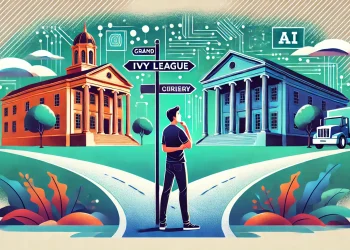No products in the cart.
Navigating the AI-Driven Job Market: A Guide for Graduates
Discover key skills and strategies for graduates navigating the fast-changing, AI-driven tech job market.
San Francisco, USA — As the sun rises over Silicon Valley, the buzz of innovation resonates in the air. Graduates stepping into the workforce today are not just entering jobs; they are navigating a landscape sculpted by artificial intelligence (AI), where adaptability and continuous learning are paramount. So how can they thrive?
The tech job market is in flux, influenced by rapid advancements in AI. With companies increasingly relying on automation, the traditional expectations of a degree and a resume are being upended. Instead, employers are now prioritizing skills, adaptability, and a willingness to learn. This shift creates both challenges and opportunities for new graduates.

According to a recent report by the World Economic Forum, over 85 million jobs may be displaced by the shift in labor between humans and machines by 2025. Yet, the same report indicates that 97 million new roles could emerge, many of which we cannot even imagine yet. The challenge for graduates is not just to find a job, but to find the right job that aligns with this evolving landscape.
One of the key skills graduates need to cultivate is technical proficiency. This doesn’t mean every graduate must become a computer scientist, but familiarity with programming languages, data analytics, and machine learning can set candidates apart. For instance, Sarah, a recent computer science graduate, landed her dream job at a leading tech firm not just because of her degree, but due to her proficiency in Python and AI frameworks. She had spent her college years contributing to open-source projects, which boosted her portfolio and demonstrated her initiative.
As companies embrace hybrid work models, the ability to collaborate effectively with diverse teams—both in-person and remote—will define successful candidates.
However, technical skills alone aren’t enough. Soft skills are equally critical in this new job market. Communication, emotional intelligence, and teamwork are indispensable. As companies embrace hybrid work models, the ability to collaborate effectively with diverse teams—both in-person and remote—will define successful candidates. Consider John, a marketing graduate, who excelled in his internship because he could articulate complex ideas clearly and work seamlessly with others across various departments.
Networking remains a powerful tool for graduates. Building relationships within the industry can lead to mentorship opportunities and job referrals. Platforms like LinkedIn have become essential for connecting with industry leaders and fellow graduates. Attending workshops, webinars, and industry conferences can also enhance visibility and provide insights into emerging trends. For example, Emily, a graduate in graphic design, attended a virtual design conference and met a creative director who later became her mentor, guiding her through her first job search.
Embracing lifelong learning is another crucial aspect of thriving in an AI-driven job market. Graduates should view their education as an ongoing journey rather than a destination. Online courses, certifications, and workshops are now more accessible than ever, making it easier for individuals to acquire new skills that align with market demands. For instance, many graduates are opting for platforms like Coursera and edX to gain certifications in data science or digital marketing, enhancing their employability.
Importantly, graduates must also remain adaptable. The ability to pivot in response to market changes can be the difference between success and stagnation. During the pandemic, many professionals had to shift their career paths entirely, leading to an explosion of interest in fields like remote project management and digital health. This adaptability can also manifest in side hustles, which are becoming increasingly popular among young professionals. These ventures not only provide additional income but also opportunities to explore new interests and develop entrepreneurial skills.
As the job market evolves, graduates should stay informed about the latest trends and technologies shaping their industries. The rise of AI is not just a challenge but also a catalyst for innovation. Those who proactively seek to understand how AI impacts their field will have a competitive edge. For instance, professionals in finance are now expected to leverage AI for data analysis and decision-making. Understanding how to harness these tools can set candidates apart in the hiring process.
Furthermore, diversity, equity, and inclusion (DEI) initiatives are becoming central to corporate hiring practices. Companies are increasingly recognizing the value of diverse perspectives, which leads to better decision-making and innovation. Graduates who can demonstrate a commitment to DEI—whether through community service, advocacy, or inclusive project work—will resonate with employers looking to enhance their workplace culture.
During the pandemic, many professionals had to shift their career paths entirely, leading to an explosion of interest in fields like remote project management and digital health.
Finally, mental health and well-being should not be overlooked in this fast-paced environment. The pressure to secure a job and excel can be overwhelming, but prioritizing self-care is essential for long-term success. Practices such as mindfulness, regular exercise, and maintaining a healthy work-life balance can lead to improved focus and productivity.
As we look to the future, it’s clear that graduates stepping into the workforce must embrace a mindset of flexibility and curiosity. The job market is not static; it’s a living entity that reflects the broader changes in society. Those who are willing to adapt, learn, and grow will not only find employment but will thrive in roles that are yet to be defined.











